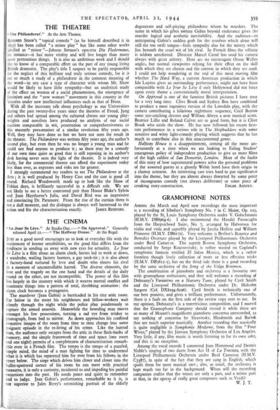BERNARD SHAW'S " topical comedy " (as he himself described
it in 1893) has been called "a minor play " but like some other works labelled as "minor "—Johann Strauss's operetta Die Fledermaus, for instance—it has- more vitality and will live longer than many
more pretentious things. It is also an ambitious work and I should like to know of a comparable effort on the part of any young living British dramatist. The play's title I suspect to be partly responsible for the neglect of this brilliant and truly serious comedy, for it is not so much a study of a philanderer in the common meaning of the word—in any case a type of character with whom Mr. Shaw would be likely to have little sympathy—but an analytical study of the effect on women of a social phenomenon, the emergence of feminism and the "new woman" movement in this country in the 'nineties under new intellectual influences such as that of Ibsen.
With all the incessant talk about psychology at our Universities during the past twenty-five years since the theories of Freud, Jung and others had spread among the cultured classes our young play- wrights and novelists have produced no analysis of our social reaction comparable in wit, penetration or comprehensiveness to this masterly presentation of a similar revolution fifty years ago. Well, they may have done so but we have not seen the result in the theatre. The Philanderer was written fifty years ago, the author's second play, but even then he was no longer a young man and he could not find anyone to produce it ; so there may be a comedy of our own time quite as good that is still reposing in its author's desk having never seen the light of the theatre. It is indeed very likely, for the commercial theatre can afford the experiment today less than ever, as expenses and risks are far greater.
I strongly recommend my readers to see The Philanderer at the Arts ; it is well produced by Henry Cass and the cast is good all round. Richard Wordsworth. made up to look like the Shaw of Fabian days, is brilliantly successful in a difficult role. We are not likely to see a better contrasted pair than Honor Blake's Sylvia and Joan Haythorne's Julia, and David Bird was an impressive and convincing Dr. Paramore. From the rise of the curtain there is not a dull moment, and the dialogue is always well harnessed to the action and fits the characterisation exactly. JAMES REDFERN.


























 Previous page
Previous page